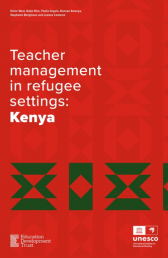
Version en ligne
A propos de la publication
This case study explores South Africa’s teacher career reforms, introduced in a post-apartheid setting to improve both equity and quality among the nation’s teaching force. These new policies combine a system of career streams that feature improved vertical and horizontal mobility with a system of salary progression based on standardized performance appraisal. The study, conducted within the framework of an international research project on teacher careers implemented by the UNESCO International Institute for Educational Planning (IIEP-UNESCO), fully illustrates the design of South Africa’s restructured teacher career model, as well as the implementation difficulties that it has faced. Drawing on evaluative reports, formal government documents, and indepth interviews with key education actors, it provides analysis on the effects of the new policies while making several recommendations for future improvements to implementation practices.









